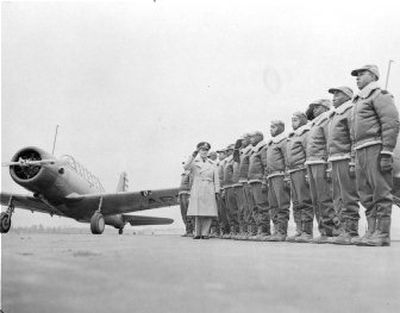Tuskegee Airmen to get medal for WWII exploits

WASHINGTON – When Charles McGee slid his P-51 fighter, “Kitten,” onto the tail of the fleeing German FW-190 in the skies over Austria in 1944, he fired his six big machine guns and struck a blow for civil rights back home.
Walter McCreary did the same a few months later, when his P-51 was hit by flak on a strafing run over Hungary, forcing him to bail out of the plane and into German hands.
And so did Woodrow Crockett’s ground crews a few months after that, when they stopped a supply train and commandeered special gas tanks so their pilots could fly without running out of fuel.
Today, the famed black World War II aviation cadre now called the Tuskegee Airmen will be honored in the Capitol Rotunda for its history-making feats when they receive the Congressional Gold Medal, the highest honor that Congress can give to civilians.
The achievement of men such as McGee, McCreary and Crockett was simple: They were bold in battle and capable in command – at a time when many in the military thought blacks could be neither.
“What we accomplished hasn’t always been recognized for, really, what it meant to the country,” McGee said this week. “There was meaning there, you might say, in a civil rights area that preceded what we know as the civil rights movement.”
From 1942 through 1946, 994 black fighter and bomber pilots were trained at the segregated Tuskegee Army Air Field, according to the group’s Web site.
Ground and support crews were trained at Tuskegee and elsewhere, and all were assigned to exclusively black aviation units that went overseas. Once in combat, they excelled.
“It really was the first time that a large group of blacks were involved in a technical area successfully,” McGee said. “It really set the background that dispelled the myths, the biases – in some cases, outright racism – that had been a part of Army policy.”
And it helped to change the country, he said.
McGee, 87, was an engineering student at the University of Illinois as World War II approached.
Sensing that the air corps might be good duty, he applied for the fledgling black aviators’ outfit that would blossom at Tuskegee.
McGee went on to fly 136 missions in World War II – he said white fighter pilots usually flew about 50. He flew 100 missions during the Korean War and 173 in Vietnam. The reason: Although the military was by then happy to have black pilots, “the airlines weren’t ready.”
It is the pilots who always get the glory, Crockett said. There were thousands of dedicated Tuskegee Airmen who were not pilots, and on Wednesday, Crockett, 88, told one of his favorite stories about the unsung ground crews.
It happened March 23, 1945, the day before a big raid on Berlin, and has come down in Tuskegee lore as “the great train robbery.”
Crockett was based in Italy and learned that the long mission would require his P-51 planes to carry more gas than their two 70-gallon drop tanks could hold. Base officials “came to me and asked me how many planes we had with 110-gallon tanks,” he recalled. “I said only three. We knew we needed some more larger fuel tanks.”
The men searched in vain for the bigger tanks. With less than 24 hours before the mission, word came that an Allied supply train carrying the larger tanks was en route. The crews hatched a plan to secure the tanks, Crockett said.
“They went and held up the train and took the larger tanks,” he said. “Then they worked all night to put them on the P-51s. It took a lot of work because they had to first drain then take off the 70-gallon tanks, put the 110s on and then fuel them. They worked all night to get the planes ready, but by 5 or 6 in the morning, we were ready to go.”
Wednesday, as Crockett pondered the Capitol Hill honor, he said he was happy that Tuskegee’s aviators are getting their due.
But deep inside, he feels a little of the sting he felt when he returned from Europe to find that he was still not afforded the privileges he fought for.
“It’s more then 60 years later,” he said. “Sixty years is a long time – a very long time.”